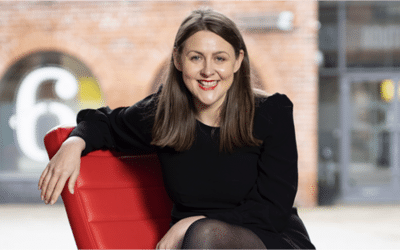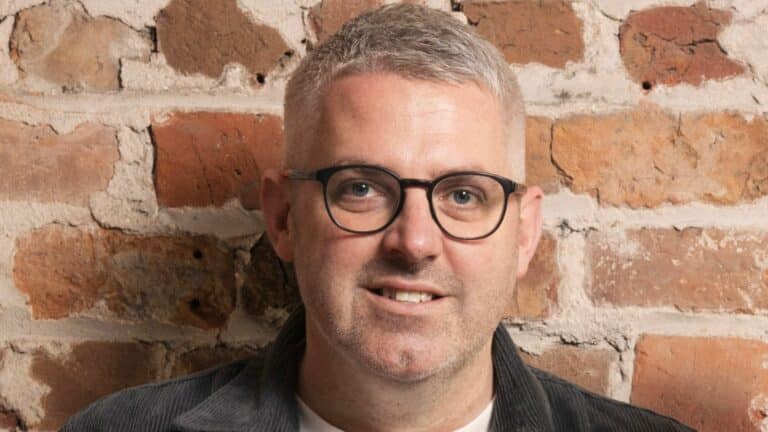Craig Fell is co-founder and managing director Lyfe Studio, a branding and design agency based in Cheshire.
Founded in 2019 by Fell and Ben Hamman, the agency recently relocated to a new Handforth office to accommodate a growing team.
From how he first entered his industry to the biggest challenges about his job, Fell shares his career journey and words of advice…
How did you first get into your industry?
I’ve always been creative and knew from a young age that I wanted to work in the creative industries. Art and design was my favourite subject at school so I chose to hone in on that during a foundation diploma. That proved a vital step in helping me realise that Graphic Design was the one for me, so the next step I took was a degree in that.
On graduating, I was one of the lucky few to be offered a position as a Graphic Designer following an exhibition of my work at New Designers in Islington. It was an internal position at a designer furniture manufacturer in Blackburn and I learnt so much there – not just about ‘the job’ but about the working world and the workplace, too. Not something that you really get from university, sadly.
What do you love about your job?
There’s a lot that I love about my job, but the ability to combine structured thinking with total creative license to deliver branding solutions is quite unique and something I take enormous pride in and joy from. When delivering creative brand solutions that are founded on solid strategy, the client gets the most out of it – nothing makes me happier in my job than to see their face when you unveil concepts for the first time. That feeling makes everything worthwhile and is proof in itself that you have to trust the process.
Who – or what – has inspired you in your career?
This one’s a bit of a cliche I’m afraid… I come from a loving family in the North East where traditional trades are deeply threaded through our past, from miners and ship builders, to welders and joiners. I was the first in my family to go to university, which was briefly questioned and then fully supported by my parents. Something that stuck with me from that period was hearing my dad say to me, like all good leaders should, “I trust you and your decisions”. I carry that forward into my leadership style today and put my trust into my team. It always brings the best out in people and encourages creative freedom, which has a fantastic impact on the outcomes we produce as a studio.
What are the biggest challenges about your job?
Spinning plates can be tricky at times, but something I’ve learned to deal with as an agency owner. No amount of planning can avoid it 100 per cent of the time so it inevitably creeps in, but we always manage it – and in fact, I quite like the buzz it creates.
Now that the team has grown and we’ve just marked our fifth anniversary, I’m less on the tools and take more of a strategic position in the business. I sometimes have to change my hat and adapt to the different roles I have – I’ve become somewhat of a chameleon in my years as a business owner and can switch modes a lot more effectively now, so can flex to whatever the studio needs.
What skills have been the most crucial to you succeeding in your career so far?
Honestly, it would be my people skills. Ultimately people invest in people and being a decent person who knows how to listen and engage aids everything else. From winning business, establishing a brief, building trust, staff recruitment and retention, it all comes down to good people skills. Perhaps I’ve got my salt of the earth North East roots to thank again, but I always take the time to get to know people and understand the problem they’re facing before rushing in with a solution, which seems to translate well for the studio and our clients. Of course being a decent graphic designer has helped along the way too!
What was your first salary and what could someone getting into the industry expect to earn nowadays?
Going back a bit here! My first salary in 2005 was £19k which was quite decent as a recent graduate. That being said it was an internal role, which notoriously paid higher than agencies back then. As a fresh design graduate, securing a job is paramount in terms of industry experience but of course, earning a decent and fair wage is vital for those leaving education and entering the working world too. I’d expect a graduate designer to be entering the market on around £22k in the current climate.
What education or training would be most useful for someone looking to follow your career path?
The path to becoming a designer is really varied but ultimately if you’re commercially minded and have the right attitude you don’t necessarily need a degree. Three years of experience could stand you in as good a stead as a three year degree. That being said, university was great for me to work out how to problem solve and establish my own creative process and style. I wouldn’t have been able to take my first job three years earlier without doing my degree, so thanks to the University of Teesside! But there’s definitely a choice of routes, so it’s worth doing your homework and finding which would suit you, your circumstances and personality best.
What advice would you have for someone looking to follow your path?
If you do go down the university route, honing in on your thinking and methodology skills is where you’ll see the most benefit. The execution aspect of our profession is at risk with the increasing prevalence of AI and cheap labour through online resourcing websites.
The human, strategic and commercial savvy nature of our profession is what good clients pay for and need to stay at the top of their game. Creative execution is a bi-product of good thinking, so learn how to creatively think and process those thoughts before you learn how to click and you’ll be on a sturdy path.












